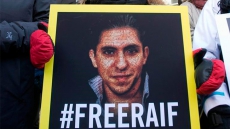OTTAWA — Parliament may have approved a year-long extension to the country's combat mission in Iraq and Syria, but the Harper government is once again refusing to say how much it will cost taxpayers.
Nor will it reveal the estimated pricetag for upcoming involvement in NATO's reassurance operations in eastern Europe.
Late Tuesday, the federal Treasury Board tabled its reports on plans and priorities for the coming fiscal year, which is a rough guidebook to upcoming departmental spending.
The costs of Operation Impact and Operation Reassurance are classified, according to National Defence.
Dave Perry of the Canadian Defence and Foreign Affairs Institute says he's astonished.
He says it is the first, and only, time since this form of Parliamentary reporting was created in 1996-97 that a cost estimate for an international operation was withheld because that information was deemed classified.
"I have absolutely no clue why this information is being withheld, and I'm astounded that it is," said Perry, an expert on defence spending who has written several detailed analyses of the effects of Conservative government's spending cuts on the military.
"I can't think of any reason why this information would — for the first time ever — now be considered classified and not releasable."
New Democrat defence critic Jack Harris accused the government of not only keeping the public in the dark, but watchdogs such as the parliamentary budget office, which had a tough time compiling its own estimate on the war earlier this winter.
"This looks like Mr. Harper wants a blank cheque for this war, with no one having access to the numbers," he said. "They've already refused the PBO access, now the public will be kept in the dark."
A spokeswoman for Defence Minister Jason Kenney said she was unable to comment late Tuesday on the decision.
The Liberals said it was unacceptable.
"The only thing that is transparent about this government is the lengths it will go to stonewall the public,” said Liberal defence critic Joyce Murray. "There is simply no rationale, other than the desire to avoid scrutiny and accountability, that explains the decision to classify this information."
The House of Commons approved a motion late Monday to extend the campaign against the Islamic State in Iraq and the Levant for a year, and expand airstrikes into Syria.
In Europe, Canada has sent a frigate to patrol with NATO's standing fleet, CF-18s for air policing over the Baltic and ground troops for land exercises with other allied nations. All of it is meant to show western solidarity in the face of Russia's annexation of Crimea.
More deployments and training are expected this year.
But it was over the cost of the mission in Iraq where the Conservatives fought a pitched battle with Opposition parties.
Former defence minister Rob Nicholson stonewalled the accountability demands of the New Democrats and Liberals, who pointed out the Americans keep a running, publicly reported tab of their expenses.
The wall of silence ended in early February with the appointment of Jason Kenney to the portfolio.
He promptly released the estimated cost to the end of the fiscal year, which amounted to $122.5 million. Although Kenney warned at the time that the figure at the end of the fiscal year could very well be higher, depending on whether the mission was renewed.
National Defence has also declared the revised estimates for that mission — and the one in eastern Europe — to be classified.
It notes that authority to spend money on both missions will come through supplementary appropriations before Parliament, but given that an election is expected this fall it will likely be a year, or more, before those figures are tabled.
The numbers add to a heightened level of secrecy surrounding both missions.
Access to flight crews carrying out the bombing campaign in Iraq — and now Syria — is non-existent. The military claims the Kuwait government won't allow journalists on its air bases.
Special forces, who are based in northern Iraq, do not allow media access. All information comes through tightly censored briefings at National Defence headquarters.
The department also prohibits photographs that identify soldiers taking part in overseas operations, including troops who recently left for a training exercise in Eastern Europe.





